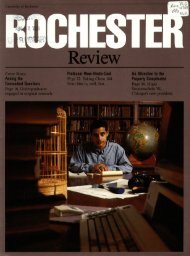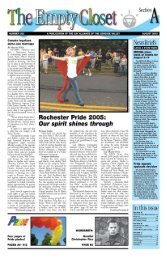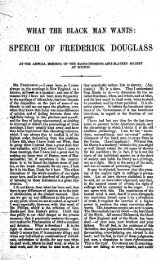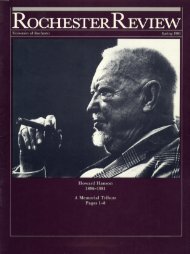Download PDF - University of Rochester Libraries
Download PDF - University of Rochester Libraries
Download PDF - University of Rochester Libraries
You also want an ePaper? Increase the reach of your titles
YUMPU automatically turns print PDFs into web optimized ePapers that Google loves.
coming to Eastman hoping that I could<br />
work with the Cleveland Quartet for<br />
even one semester," says Maria. "So<br />
we've gotten awfully lucky."<br />
Maria may call it luck. But to the<br />
judges <strong>of</strong> the international competition<br />
it was rather more than that. "They<br />
simply happened to be the best," says<br />
one <strong>of</strong> the jurors, J on Engberg,<br />
associate director for academic affairs<br />
and associate dean for graduate studies<br />
at the Eastman School.<br />
Dating back to 1976, when the<br />
Cleveland joined the school, the competition<br />
reflects that well-established<br />
group's desire to nurture younger colleagues,<br />
something it believes in<br />
strongly.<br />
Eastman stages the competition<br />
biennially, when it invites quartets<br />
from around the world to audition.<br />
The winning ensemble, which receives<br />
tuition remission and a stipend, is invited<br />
to the Eastman School for a twoyear<br />
period to study with the Cleveland<br />
and other members <strong>of</strong> the string<br />
faculty. "The winner comes as a<br />
quartet," says Engberg, "and its first<br />
order <strong>of</strong> business is to study, rehearse,<br />
and perform as an ensemble. This<br />
group occupies a special place at<br />
Eastman."<br />
More than equal to the task, the<br />
Meliora players have, by the end <strong>of</strong><br />
their first year, rapidly blossomed into<br />
one <strong>of</strong> this country's most promising<br />
young chamber groups, which means<br />
three things: They have talent, they<br />
have a flair for performance, and they<br />
get along with each other. The value <strong>of</strong><br />
that last part cannot be overestimated.<br />
"Successful, pr<strong>of</strong>essional chamber<br />
groups are very hard to keep<br />
together," Engberg notes.<br />
"There's an old cliche," says<br />
Cleveland Quartet cellist Paul Katz,<br />
"that says that a quartet is like a fourway<br />
marriage, with all <strong>of</strong> the disadvantages<br />
and none <strong>of</strong> the advantages. "<br />
"You get to know somebody musically,<br />
and that individual's personality<br />
is going to come out too," is the way<br />
Calvin puts it.<br />
"That's what the rehearsals are<br />
about," says Betsy. "Just as much as<br />
they are about learning the music and<br />
understanding the composer, they're<br />
also about understanding the people<br />
you're playing with well enough so<br />
that all four <strong>of</strong> you can understand the<br />
composer."<br />
Playing, therefore, isjust part <strong>of</strong><br />
what being a quartet is about. Yes, the<br />
Meliora Quartet won the Cleveland<br />
Quartet Competition; yes, it has twice<br />
been accepted to participate in the<br />
Aspen Music Festival's Center for Advanced<br />
Quartet Studies; yes, it tied for<br />
top place in the Fisch<strong>of</strong>f National<br />
Chamber Music Competition in South<br />
Bend, Indiana, in April <strong>of</strong> this year<br />
and then went on to win the Coleman<br />
Chamber Ensemble Competition in<br />
Pasadena later that month; and yes, it<br />
will make its New York City and<br />
Boston debuts this fall. But kudos<br />
alone does not a quartet make. In<br />
many ways, the Meliora Quartet's<br />
most notable achievement is the<br />
maintenance and development <strong>of</strong> the<br />
positive chemistry existing among its<br />
members.<br />
"They have an attitude and enthusiasm<br />
that is consistent among all four<br />
<strong>of</strong> them, which is unusual," says<br />
Engberg. "Very <strong>of</strong>ten, you will find<br />
one or more <strong>of</strong> the people in a group to<br />
be somewhat <strong>of</strong> an outsider. But everybody<br />
in this group is really dedicated to<br />
one another. "<br />
Their spirited interrelationship is<br />
best on display in rehearsal, where<br />
they might be playing only half the<br />
time, discussing and critiquing individual<br />
and group performances the<br />
other half. Give and take is fluid, comments<br />
and suggestions readily requested<br />
and received.<br />
"Did the tempo seem slow?"<br />
"Yeah."<br />
"Oh, I liked it. "<br />
"J ust a touch faster-the whole<br />
thing. "<br />
"But it has a grace to it. "<br />
Short, explosive instrumental examples<br />
punctuate many <strong>of</strong> the discussions<br />
about particular passages. Likewise<br />
anyone <strong>of</strong> the group members may<br />
spontaneously sing a bar or two to illustrate<br />
a musical point.<br />
The playing itself is dynamic, energetic,<br />
assured, even in the rehearsal<br />
room's inevitable fragments. Heads,<br />
shoulders, forearms, elbows dip this<br />
way and that. First violinist Ian is<br />
animated facially-his eyebrows darting<br />
up and down, his eyes and mouth<br />
evincing the effort <strong>of</strong> playing, as if he<br />
were yanking the notes he plays from<br />
somewhere deep within. On all four<br />
faces is written one word, in bold letters,<br />
and underlined: concentration.<br />
For in a quartet, you must not only<br />
play-you must listen to three others<br />
play at the same time.<br />
"You're always reminding yourself<br />
to listen," says Maria.<br />
Betsy elaborates. "Sometimes you<br />
find yourself getting so involved in<br />
your own part that you realize you're<br />
not playing with the other people. At<br />
other times, you're sort <strong>of</strong> sinking in<br />
with the sound <strong>of</strong> the group so much<br />
that you don't really play your own<br />
line as convincingly as you could."<br />
This constant playing <strong>of</strong>f from one<br />
another extends beyond the strings and<br />
bows. Even in conversation, sentences<br />
are sometimes started by one, completed<br />
by another, and interpreted by a<br />
third, each member's voice intertwining<br />
with and augmenting other voices<br />
much as their instruments do when the<br />
talking stops. One might wonder if this<br />
compatibility developed gradually or if<br />
it just clicked.<br />
"There's always something <strong>of</strong> an adjustment<br />
time," says Maria.<br />
"I think there really should be,"<br />
adds Calvin.<br />
"But there's both things happening<br />
all the time," Ian points out.<br />
"There's also a click, there really<br />
is," concludes Betsy.<br />
Call it harmony at first sight-just<br />
an old-fashioned boy-meets-girl-meetsboy-meets-girl<br />
story. Calvin attempts<br />
to unravel it.<br />
"Two summers ago, at the Aspen<br />
Music Festival [a summer music<br />
school held annually in Aspen, Colorado],<br />
Maria and Ian and Betsy<br />
played in a string quartet together.<br />
The following year, Ian and I both<br />
came here to Eastman, where Maria<br />
and Betsy were both already<br />
studying." Ian, originally from Pearl<br />
River, New York, transferred from<br />
Juilliard, joining Maria, a Missoula,<br />
Montana, native, in the junior class.<br />
Calvin, from Grand Rapids, Michigan,<br />
went to Eastman for his Master<br />
<strong>of</strong> Music degree, after graduating from<br />
Oberlin College. Betsy, the celloplaying<br />
pride <strong>of</strong> Sacramento, California,<br />
received her Master <strong>of</strong> Music
















